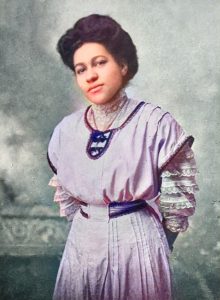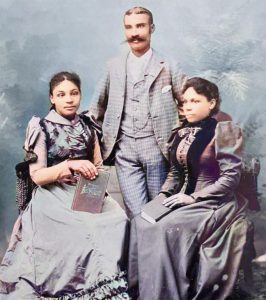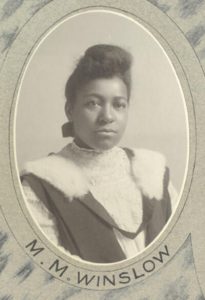Freedom of Thought
“After graduation I speedily found the limitations of the ‘Color’ line – although my family had behind them a history of one hundred years of honourable citizenship, I found it utterly impossible to find the opportunity to do the work for which I had been trained.”
– Mary Matilda McAlpine, Houlton Maine, 1954

Mary Matilda Winslow was the first “Woman of Color” to graduate from the University of New Brunswick, Canada’s oldest English language University.
Mary Matilda Winslow (1880 – 1963) was born in Woodstock (New Brunswick) and graduated from the University of New Brunswick (UNB) in 1905. She was the first Black woman to attend the University of New Brunswick, graduating top of her class, and winning the Montgomery-Campbell Prize for Classics.
Mary Matilda came from a very interesting and diverse background. Her father, Alfred Fairfax Winslow (1847-1917) was a descendant of the Pilgrim Governor of Plymouth Massachusetts, Edward Winslow (1595-1665). He was also the grandson of Loyalist Col Edward Winslow. Alfred Fairfax Winslow’s parents were Joseph Winslow (b. 1813) and Sarah Cornelison (1814-1864), who in 1851 lived in the Parish of Queensbury (York County).

Mary Matilda’s father was the grandson of Loyalist Col Edward Winslow, who settled at Kingsclear. Pictured here are Mary Matilda (seated on the left), with her father and mother (Sarah Deboise), circa 1895.
Mary Matilda’s mother, Sarah Deboise (or DuBois), was descended from Henry P. Dubois (b. c. 1810). Family folklore states that he was a ship pilot or navigator, who was honored with an award from the King of England for his service on the St. Lawrence River; the award was an island somewhere off the coast of British North America. After receiving his award, Henry Dubois sailed to Liverpool England, where he met and married his wife Mary Ellen Delaney, who was born in Dublin of Irish/English descent. They had Mary Matilda’s mother Sarah in England, and later moved back to New Brunswick, where they raised 6 more children.
Life in the Jim Crow South
After graduating from UNB, Mary Matilda was unable to find meaningful work as a Black woman in Canada, so she decided to teach in Alabama. There she taught “diction to fractions” at Central College.
Life was not easy in the Jim Crow South, and Mary Matilda soon realized that many of her students were arriving without an adequate education. So to assist, she began teaching and lecturing in remote communities throughout the state. This was dangerous work for a Black person; she knew she had to be careful, so as not to anger the Ku Klux Klan. It was at this time that Mary Matilda met her future husband, Francis P. McAlpine, who was an educator/principal and founder of a newspaper called the Birmingham Free Speech. This newspaper was devoted to the moral, financial, and educational development of the coloured race.
The McAlpines did not wish to raise their children in a world that was segregated, so they left Alabama in 1916, and settled in New England, with the hopes of living in a free and open society. Moving to Connecticut, Francis McAlpine became editor of the Hartford Herald, one of the first newspapers “dedicated to the interest of the colored citizens of the City”.
Discrimination in Massachusetts
They then settled in Springfield, Massachusetts, believing that the New England city would be more welcoming to them; but they soon discovered otherwise. Springfield was not as progressive as they thought. As a Black woman, Mary Matilda was not allowed to teach in the public school system—even though she had graduated Suma Cum Laude from UNB, and had taught in Alabama; likewise, her husband Francis—a highly educated and intelligent newspaper man—was only able to obtain public service employment as a mail carrier. So, in an effort to improve opportunities and education for people of African descent in Springfield, Mary Matilda joined a multi-ethnic committee aimed at opening doors for Blacks. This led to her later becoming a professor at Springfield College.
Mary Matilda Winslow’s determination in trying to improve the plight of Black people was passed on to her children and their children; so too was her passion for education, literature, and music. In looking back on her life after leaving UNB, Mary Matilda reflected:

Mary Matilda Winslow graduated Suma Cum Laude (top ranked) from the University in 1905, winning the Montgomery-Campbell Prize in the Classics.
“I realize I have failed in the shining ideas I had at graduation— ‘to follow knowledge like a sinking star, beyond the utmost bounds of human thought’. I am comforted, however, with remembering the hundreds of young people I have contacted during these short years… I like to think that to some of them I have given part of the two most precious gifts UNB gave to me—the ability to think, and a clear knowledge of the freedom of thought.”
Mary Matilda Winslow’s pioneering spirit, and self-confidence to pursue pathways in the face of adversity, remain her greatest legacy.

